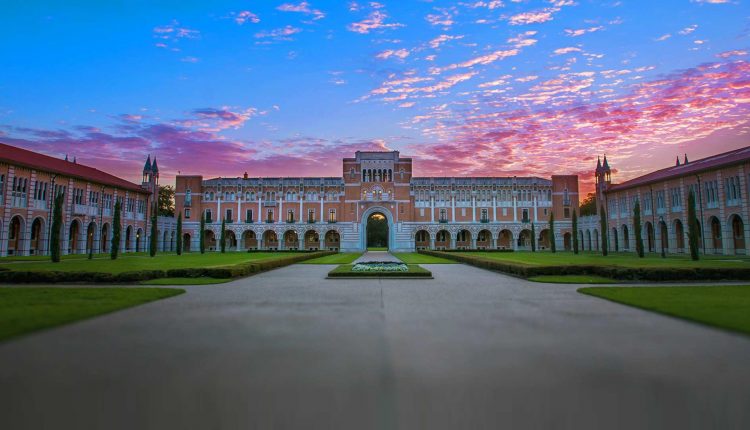Rice University: Incoming freshmen RISE to the occasion
Incoming freshmen interested in exploring questions of racial justice, equity and urban life were welcomed to campus this July with a new program aimed at familiarizing them with both Rice and Houston.
Fourteen students, all pursuing humanities or social sciences majors, were the inaugural cohort of RISE (an acronym standing for responsibility, inclusion and student empowerment). At its core, RISE is a 10-day seminar on what Alexander Byrd, history professor and vice provost of diversity, describes as “the ways in which race, place and power converge in and shape the city of Houston.”
During 10 days filled with field trips, cross-campus walks, West Servery breakfasts, daylong seminars and evening bonding sessions, the incoming freshmen endeavored, as Byrd put it, “to get a toehold” on the unique ways in which an urban and highly diverse setting like Houston can enrich their education, and vice versa.
The seminar developed by Byrd and Chelsea Drake, assistant director of the Rice Emerging Scholars Program (RESP) in Rice’s Office of Student Success Initiatives, also looked at the ways in which the humanities and social sciences can illuminate important issues within urban settings, from segregation to gentrification.
These are students, said Drake, “who feel responsible to their communities and backgrounds.” RISE aims to begin equipping them with the tools they’ll need to be successful students as well as leaders at home. And as of Aug. 13, home is Rice.
“I keep telling all of them that in four years, when they’re seniors, I expect them to be running this place, in really big leadership positions, and to have really made the most of their time at Rice,” said Drake.
Like RESP, the new RISE program is also a residential experience, offering first-generation freshmen a sneak peek at life on campus and additional orientation before O-Week — which is a whirlwind experience unto itself. Attendance is not only free, RISE also provided a stipend for students in order to make the program as accessible as possible.
During their 10-day session, the students got acquainted with professors and graduate students working in the humanities and social sciences and learned the campus ropes from mentors like Morgan Seay and Soha Rizvi. As rising seniors and roommates at Hanszen College, Seay and Rizvi volunteered to spend the session answering questions about Coffeehouse, course loads and college socials (and, of course, what to do if you accidentally lock yourself out of your dorm room).
Seay, who’s serving as Hanszen president this year, also came to Rice as a humanities and social sciences double major. Since hearing about RESP — which focuses on students majoring in science, technology, engineering and math — she’s advocated for something similar for her fellow non-STEM majors.
“To see that this has come to life and to be a part of it is just really exciting,” Seay said.
Rizvi, who serves as a diversity coordinator for O-Week, was just as excited to see a solid week-and-a-half devoted to important topics of race, inclusion, bias, allyship and much more, all discussed in nuanced terms with plenty of listening on all sides.
“These students came in with so much background knowledge and vocabulary that I did not come into college with,” Rizvi said. “It makes the conversations so rich and more productive than just going over things that we all know.”
On the second-to-last day of the RISE session, the inaugural cohort gathered in one of the Provisional Campus Facilities to give their final presentations. Dressed to impress, each of the students spoke with the polish and poise of practiced upperclassmen before Byrd and their colleagues peppered them with thoughtful questions. When it was time to break for lunch, they made the now-familiar stroll down to the West Servery as a tight-knit group.
“The community here has been amazing,” said incoming freshman Ari Petteway.
“The community here has been amazing,” said Ari Petteway, who’s coming to Rice from Austin to pursue a career as a criminal defense attorney. “Seeing professors who have that background and seeing people who also look like me — who have the same ideas — and hearing from them was a great, great, great experience.”
Even though Petteway anticipates culture shock within a predominantly white university, “I know that I’m going to have this community throughout my four years at Rice and that I have these people that I can turn to,” she said.
Kam Walls, who wants to be a federal judge, was drawn to RISE because it promised to dig into pressing matters of race and justice. The Las Vegas native is already keenly aware of the pressures facing this generation and saw RISE as a way to equip himself for the road ahead.
“I kind of want to be uncomfortable, if that makes sense; I want to be comfortable with being uncomfortable,” Walls said. “It’s all for the greater good. The main goal is — I wouldn’t necessarily say fixing everything, but to try and find solutions to our everyday problems. I just want to be a part of that.”

